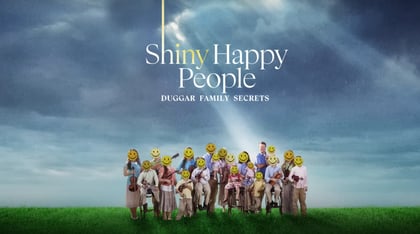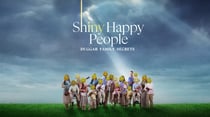Those pesky homeschoolers - Issue #340

Just when I thought I was out, they pull me back in! I was homeschooled, as was my wife, as are our kids. We watched the Amazon documentary Shiny Happy People in one sitting. It was about a different kind of homeschooler: hyper-conservative, fundamentalist, afraid. And yet, many parts of the documentary hit far too close to home, especially its final episode, where we saw rooms we’d been in and people we knew. And then the Washington Post published a long profile on one of our college classmates. I can’t stop thinking about these stories and what there is to learn from them. My current encapsulation: to move forward, we need a middle way.
– – – – –
The impulse for some people to homeschool is fear. Some of my parents’ generation were afraid and hid themselves and their kids from “the world.” Their religious practice was fundamentalist; their lifestyles and politics were conservative. The same impulse–fear–led families into Bill Gothard’s IBLP craziness.
Fear defines a negative line in the homeschool movement. The documentary shows the impact of that original sin. Some people in my generation are aware of the fear and are trying to be different. Some of my homeschooled peers are sending their kids to school. That choice isn't controversial, but for our parents' generation, those who made a radical choice in the ‘80s to opt out, it’s a reversal. But, to me, the underlying impulse appears to be the same: fear and its reaction. Some of our parents feared the culture; the next generation seems to fear their childhoods.
Perhaps some childhoods are to be feared.
I went to college with Christina, the subject of the Washington Post profile linked below. The story was sad, but, for me, odd: I don’t remember her as a likely totem for revolt. Christina said, in a Facebook post, that she was aware of abuse and “specifically gaslit” and “warned how to keep things secret from outsiders who might ‘steal us away’ from our families.” It’s a shame to see this kind of wild fear manifest in life, especially in childhood.
But that didn’t ring true to my experience. Some parents made the choice to homeschool from a place of freedom. I think that was true for my parents and I hope it’s true for me.
Eckhart Tolle, on the past:
If your mind carries a heavy burden of past, you will experience more of the same. The past perpetuates itself through lack of presence. The quality of your consciousness at this moment is what shapes the future.
– – – – –
The Duggars were afraid, too. First of the “world” and then of losing their fame, wealth, and power. They adopted an absurd, draconian lifestyle out of fear. No wonder it crumbled in the end: life is about freedom and generativeness, not rigidity and scarcity.
On Gothard, the documentary exposed problematic teachings, awful double standards, and miserable abuse and misogyny. They didn’t quite pin-point the root cause. It doesn’t seem to me to be religion or politics: co-religionists and other conservatives didn’t share the Gothard movement’s fatal flaws. On the Duggars, the documentary echoed TLC's incredulousness about people who lived a very conservative religious lifestyle, but with the knowledge of these people’s scandals. It was more sleight of hand than compelling argument.
There are, sadly, enough profiles of abused religious and homeschooled people to make us familiar with the story. What was done to some kids is reprehensible. But not everyone was similarly victimized. You can’t sweep away the victims, nor can non victimized people (like me!) be ignored. There is a middle way, one of freedom, not fear.
The Washington Post was pleased that some homeschooled people are now sending their kids to public school. Almost despite itself, the end of the Post’s article shows the middle way. There’s a riveting scene, when the homeschool pioneer grandparents show up, awkwardly, at their grandkids' school play. I thought it took courage to arrive at that moment. It seemed to me that the writer judges them for not doing it well enough. I thought that they were doing the best they could to find freedom.
Eckhart Tolle, on our parents:
Accept your parents' behavior with compassion, without needing to react to it, that is to say, without personalizing it. Be aware also of your own unconscious assumptions or expectations that lie behind your old, habitual reactions to them.
– – – – –
The documentary took a turn when it featured Alex Harris, alum of my alma mater, talking about "the Joshua generation." The talk track mirrored the WaPo article: some conservative Christians raised their kids in a way bordering on or veering into abuse, some conservative Christians wanted political power, and some the next generation are reversing their parents’ decisions by moderating their politics or sending their kids to public school. It's a bit hard to write a real trend piece here: the plural of anecdote is not data. It's also hard to believe it when powerful, conservative people talk about how unpolitical and not extreme they are now.
One of my old friends is now actively and angrily ex-evangelicals and ex-conservative. But she hasn’t lost the intense lifestyle politicization that the shiny happy people had for Gothard’s nonsense. But instead of adopting traditional gender roles and performative fundamentalism, she wants you to microdose psilocybin and go on ayahuasca retreats. At the extreme, the same impulse can manifest itself in hyper-conservatism or in wild disregard for any standards at all. A middle way would be better.
This is where I agree with the article and documentary: the over-politicization of life isn't something we should carry forward. Defining yourself by the people you fear, whether its conservative Christians or godless heathens, inextricably ties you to those people. I suppose you could call some of us ex-evangelicals, or no-longer right-wing, but those labels attach us to the thing we fear. We’re better off being free of all of it.
Eckhart Tolle, on parenting:
The parents don’t realize that the child needs them to be, as Susan Stiffelman so aptly calls it, “the Captain of the ship,” a term that by no means implies reverting back to the authoritarian mode of education of past ages. Rather, it is about finding a balance, a middle way, between having an excess of structure and no structure at all.
Reading
The revolt of the Christian home-schoolersThey were taught that public schools are evil. Then a Virginia couple defied their families and enrolled their kids. |
|
Shiny Happy PeopleA limited docuseries exposing the truth beneath the wholesome Americana surface of reality tv’s favorite mega-family, The Duggars, and the radical organization behind them: The Institute in Basic Life Principles. |
|
|
|
